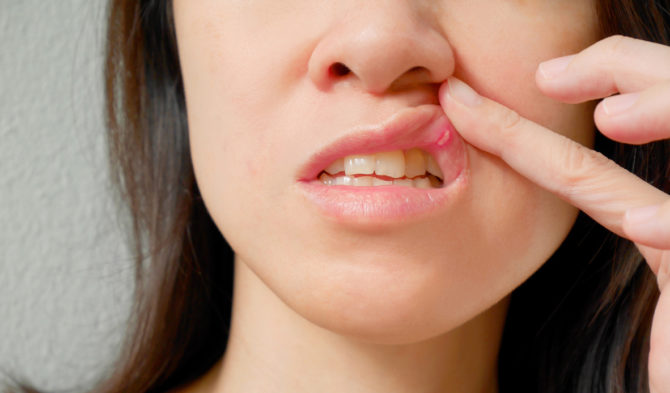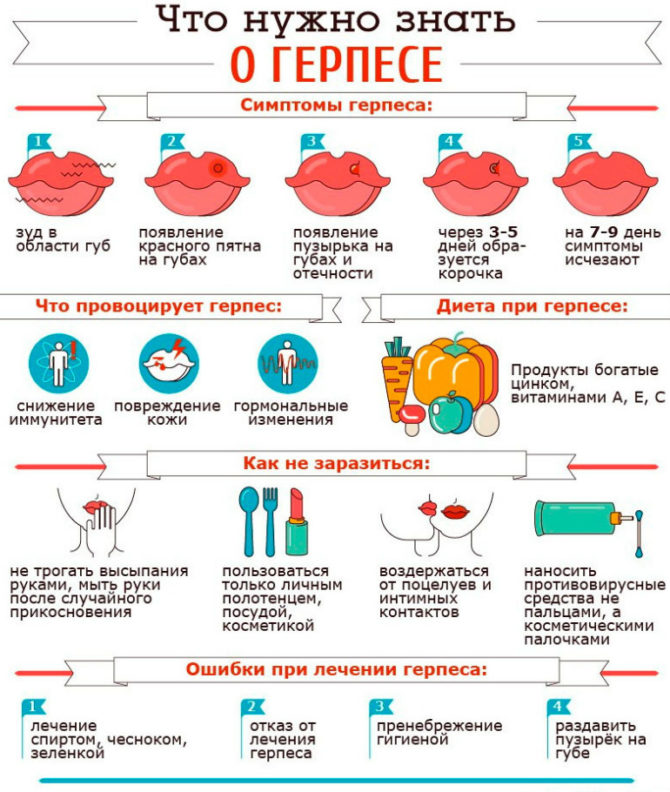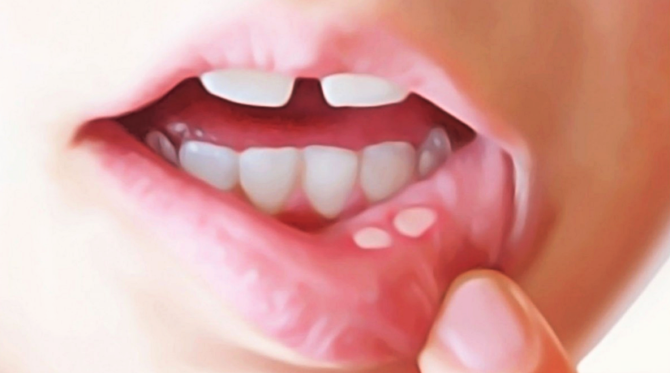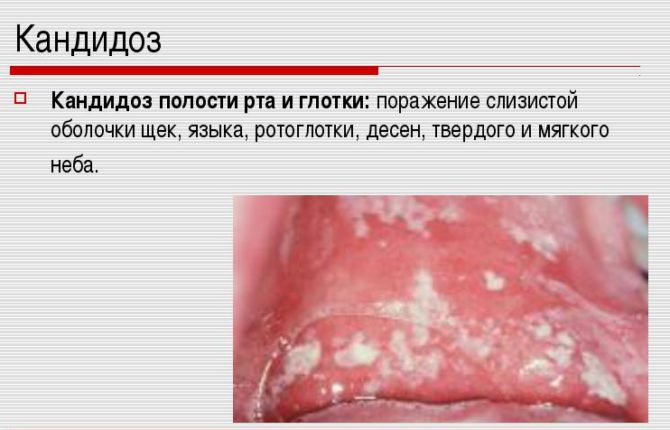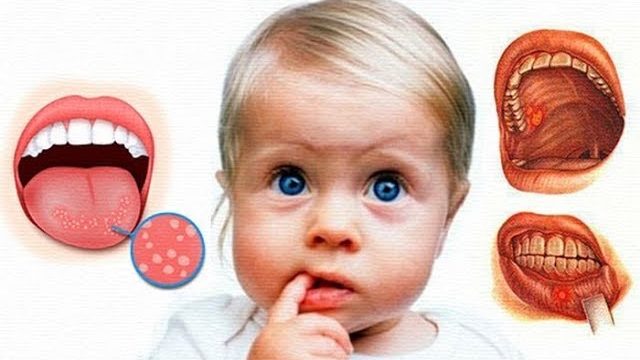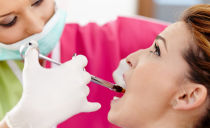Treatment of stomatitis in the mouth in adults at home
Stomatitis is a disease of the oral cavity, which is accompanied by inflammation of the mucous membranes, the appearance of painful ulcers, aphthae, vesicle rashes. Typically, treatment of stomatitis in adults and children is carried out at home using various forms of medications: tablets, drops, sprays, gels, lozenges, mouthwashes.
Content
Causes of the disease
Many consider stomatitis to be a childhood disease caused by the use of unwashed foods. But the problem also affects adults, the causes of its appearance may be:
- infection of the oral mucosa with bacteria or viruses through the patient’s personal belongings, dishes or a kiss;
- plaque, tartar and any manifestations of poor-quality care for the oral cavity, teeth;
- smoking; alcohol abuse;
- any damage to the mucous membrane with its further infection;
- poor-quality denture;
- an allergic reaction to foods, medicines, cosmetics;
- activation of viral infections, bacteria, pathogenic flora against a background of weakened immunity.
Foci of stomatitis occur on the cheeks, tongue, palate, gum, and throat. The more active the pathogen and the weaker the patient’s immunity, the more difficult the disease is and the wider damage to the mucosa. In patients with a strong immune system, only slight inflammation of the mucosal surface is possible, without ulcers and aphthae. It is important not to hesitate, but to seek help and effective treatment for stomatitis from an experienced doctor.
Types of disease
There are several forms of stomatitis in the mouth in adults:
| Depending on the cause of the appearance (pathogen) | By external signs and clinical picture | By the nature of the development of the disease |
|---|---|---|
|
|
|
How to treat stomatitis in adults in the mouth
Dentists isolate slightly different types of stomatitis in the mouth in adults: herpetic, aphthous, allergic and prosthetic, candidal and ulcerative necrotic. Their treatment is performed at home under the supervision of a specialist.
Herpetic
A type of stomatitis caused by the herpes virus. According to statistics, only 2% of the planet Earth’s population is not infected with this virus. The first contact with the pathogen in most cases occurs in childhood, so the chances of an acute form of the disease in adults are very few.
The list of factors contributing to the development of the disease includes:
- low immunity;
- spring vitamin deficiency;
- antibiotic treatment;
- stress
- diseases of the teeth and gums;
- inflammatory processes in the body;
- chronic diseases;
- respiratory diseases: tonsillitis, sinusitis;
- bad habits, smoking.
At the initial stage of the disease, patients notice that their lymph nodes have become inflamed, a transparent vesicle rash has appeared, concentrated in one place: in the sky, palatine arches, in the tongue, on the lips or cheeks. In the future, the bubbles burst, and in their place one large or several small wounds are formed. At first, erosion is red, but soon they become covered with a whitish coating. The resulting wounds are very painful, especially when chewing, talking.
Treatment for aphthous stomatitis lasts up to 2 weeks. To quickly recover from the first manifestations of stomatitis, antiviral drugs are prescribed, rinsing the mouth with disinfectants, followed by treatment of the affected areas with therapeutic ointments, for example, Viferon-gel. Be sure to pay attention to increasing the patient's immunity through the use of immunomodulators, vitamins.
To reduce pain, lower fever, painkillers, antipyretic drugs can be prescribed. In case of localization of rashes on the lips, ointments, creams against herpes are used.
Attention! Herpetic stomatitis is a contagious disease. Therefore, drinking from one cup and kissing with a sick person is unsafe for health.
Aphthous
In adults, it manifests itself in small painful sores on the oral mucosa. They have a rounded shape, a clear red border, and their inner cavity is covered with plaque. Aphthae are formed mainly on the inside of the cheeks, lips, rarely on the tongue. What does an aphthous stomatitis look like in an adult, look at the photo.
Symptoms of aphthous stomatitis worry adults for no more than 10 days, treatment involves the following actions:
- Avoid foods and medications that may cause an allergic reaction. Food and drug allergies most often precede the development of stomatitis in adults. Antihistamines are prescribed to help the body.
- It is necessary to rinse your mouth regularly with disinfectants, and then treat the affected areas with Holisal gel, Stomatophyt A-balm.
- It is necessary to use regenerating ointments, gels (Solcoseryl) to relieve pain and speed up the healing process.
- When the first signs of the development of the disease appear, it is recommended to drink immunostimulating medicines, vitamins.
- You should visit your dentist for oral sanitation if the disease is caused by staphylococcal bacteria. He will remove plaque and stones, heal teeth affected by caries.
Treatment of aphthous stomatitis in adults is only medication, lasts up to 12 days.
Allergic
This is a reaction of the body to a strong external stimulus (allergen), to which the patient has excessive sensitivity. Allergies reduce immunity and increase the risk of infection by harmful bacteria, viruses, microorganisms.
To eliminate the ailment, it is important to timely identify the product to which the body responds in a similar way, and to exclude contact with the allergen. The disease is treated with antihistamines.
Prosthetic
Prosthetic stomatitis occurs mainly in people over 35 for two reasons:
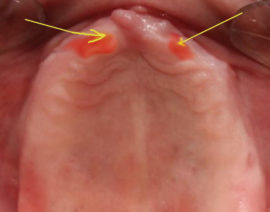 As a result of an allergy to the material of the prosthesis. This is due to a violation of the proportion of monomer in the manufacture of the prosthesis. Treatment of this form of the disease involves replacing the prosthesis made with a quality one, taking antihistamines.
As a result of an allergy to the material of the prosthesis. This is due to a violation of the proportion of monomer in the manufacture of the prosthesis. Treatment of this form of the disease involves replacing the prosthesis made with a quality one, taking antihistamines.- Due to the accumulation of pathogenic microorganisms on the surface of the prosthesis due to insufficient care for it. To eliminate the symptoms of the disease and its treatment in adults, rinses with chlorhexidine three times a day are used. The prosthesis itself is subjected to total professional cleaning, twice a day the place of contact with the mucous membrane is treated with Holisal gel. Such a disease is treated for 10 days.
Candidiasis
It belongs to the category of fungal diseases, since the causative agent of the disease is the yeast-like fungus Candida albicans. Infants are at risk because of the immaturity of the oral mucosa, unformed immunity, and frequent dysbiosis. A baby can become infected with a fungal infection during childbirth from a mother who is sick with thrush.
Oral candidiasis also occurs in adults. Its development is accompanied by immunity, weakened by prolonged use of antibiotics, diabetes mellitus, tuberculosis and other complex chronic diseases.
Symptoms of the development of an ailment in adults:
- burning in the mouth and throat;
- the surface of the tongue covered with a whitish coating, the mucous membrane of the mouth and throat;
- if you try to get rid of plaque, the areas affected by the fungus will begin to bleed;
- bad breath.
Treatment of candidal stomatitis in adults involves the rejection of antibiotics, medications associated with the development of thrush, or their replacement with others. To combat the "milk" fungus, potent antifungal tablets, creams and ointments are used.
With candidal stomatitis in adults, the following medications are recommended: Levorin, Nistanin, Candide, Clotrimazole, their analogues.
The treatment complex also includes treatment of the oral cavity with anti-inflammatory, antiseptic agents. A spray from stomatitis Lugol, rinsing with soda solution is well suited in this case. Immunostimulating agents and vitamins will help speed up the healing process.
During treatment, try to pay more attention to oral hygiene. If you wear dentures, remove, wash and wipe them daily. At night it is recommended to leave the prosthesis in a solution of Chlorhexidine.
Attention! Medications for stomatitis in adults are prescribed only by a doctor. Self-medication is dangerous to the health of the patient and leads to complications.
Necrotic ulcer
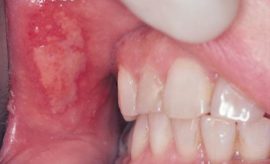 The disease is caused by the activity of harmful bacteria against a background of weak immunity, poor oral hygiene, and smoking. At the stage of the disease, the general condition of the patient worsens, the body temperature rises, the gums begin to bleed, and dry mouth appears.
The disease is caused by the activity of harmful bacteria against a background of weak immunity, poor oral hygiene, and smoking. At the stage of the disease, the general condition of the patient worsens, the body temperature rises, the gums begin to bleed, and dry mouth appears.
Further symptoms intensify, gums, palate, cheeks and tongue are covered with a white-gray coating, temperature can rise to 40 °C. Any meal, brushing your teeth is accompanied by pain. In the chronic form of the disease, exposure of the roots of the tooth, necrosis of the gingival papillae occurs. What stomatitis looks like, look at the photo.
Treatment of a ulcerative necrotic form of the disease is carried out in two stages: first, at the dentist, then at home using drugs.
For home therapy are prescribed:
- Antibiotics: injections or pills for stomatitis.
- Rinse the mouth with a disinfectant solution 3 times a day.
- Treatment of gums, gingival papillae and inflamed mucous membrane with gel Holistic, Metrogil-dent. Smear them with mucous membranes 3 times a day, and only after rinsing with chlorhexidine or using Miramistin spray.
- Taking antihistamines, they are mandatory in the treatment of stomatitis.
During and after the course of therapy, it is necessary to strengthen the immune system with special medicines and vitamins. Medication for ulcerative necrotic stomatitis in adults lasts 10 days.
Choose a remedy for stomatitis in the mouth
All funds for the treatment of stomatitis in the mouth in adults are divided into 9 groups:
- Antiviral drugs. Directly affect the virus that caused the development of the disease. Among the variety of pharmaceutical products, experts distinguish Tebrofen and Oxolinic ointments, Acyclovir and its analogs, Bonafton.
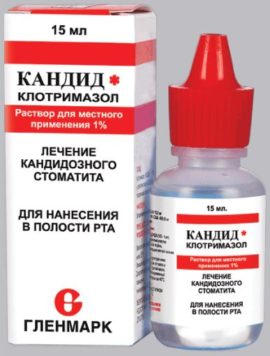 Antifungal. They are prescribed if the pathogen is a fungus. The best remedy for candida stomatitis in the mouth is Candide cream. They also use Diflucan and Levorin capsules.
Antifungal. They are prescribed if the pathogen is a fungus. The best remedy for candida stomatitis in the mouth is Candide cream. They also use Diflucan and Levorin capsules.- Antihistamine drops and pills, which are used to treat allergic stomatitis in adults, as well as to prevent an allergic reaction, swelling of the mucosa in other types of disease. Most often, experts prescribe Suprastin, Cetirizine, Tavegil, Fenistil, Loratodin.
- Antibiotics. Potent drugs that contribute to the death of harmful bacteria and prevent the complication of the disease. The form of the drug can be different: injections, tablets, sprays, solutions. For the treatment of stomatitis in adults, Amoxicillin, Lincomycin, a solution of chlorhexidine bigluconate, Biseptol are recommended.
- Disinfectants, anti-inflammatory drugs. Permanent assistants in the fight against stomatitis, are used to treat affected areas, relieve inflammation. In home treatment, drugs in the form of a spray, aerosol or solution are used. The best among them are Miramistin, Stomatofit, Ambazon, Sanguirythrin, hydrogen peroxide.
- Immunomodulating drugs. Do not affect the causative agent of the disease, but will be no less useful for a quick recovery. Their action is aimed at strengthening the weakened immunity of the patient and increasing the body's resistance to the disease. For these purposes, Imudon resorption tablets, Aekol vitamin solution, Vitrum complex, Vitrum, Alphabet, Complivit are used. In acute forms of the disease, inexpensive Galavit injections are prescribed.
- Regenerating and wound healing. Mostly these are ointments, pastes, gels, which accelerate the healing of damaged tissues. They are applied directly to the wound, previously treated with a disinfectant. Well-proven dental paste Solcoseryl, oil solution Carotoline, propolis-spray. Natural rosehip and sea buckthorn oils, propolis ointment are recognized as the strongest folk remedies.
- Painkillers. Relieve pain, reducing the sensitivity of damaged tissues. Popular anesthetics are Lidocaine, Trimecaine, Instillagel. Among folk remedies - Kalanchoe juice. The properties of anesthetic possess many anti-inflammatory drugs, also used to treat stomatitis in the mouth in adults.
- Antipyretic. Rarely used in treatment, designed to lower body temperature. Paracetamol and acetylsalicylic acid formulations are recognized as effective.
An important point! Before taking medications, do not be lazy to study the instructions for them, check the list of contraindications and dosage.
Stomatitis in a child: what to do and how to treat
The child’s body is more sensitive to drugs and their effects on internal organs, so not all stomatitis medications can be used to treat children.
For the treatment of diseases of the mucous membrane in the mouth in children use:
- Acyclovir. Antiviral drug, an effective remedy for herpetic stomatitis in the mouth in children older than 2 years. For patients under the age of two years, the use of the drug is allowed, but with a decrease in dosage by half.
- Miramistin Spray. Great antiseptic. Additionally it has an antiviral, bactericidal effect. During the treatment period, the mucous membrane is sprayed 3-4 times a day.
- Lollipops Imudon. Powerful immunomodulating agent for adults and children. It is used for the treatment and prevention of the disease.
- Viferon. Immunostimulating, antiviral medicine for stomatitis in the mouth. Contains vitamins E, C. It is produced in the form of suppositories, gels, ointments of various dosages.
- Suprastin. It belongs to the category of antihistamines. For the treatment of children, its analogues Diazolin, Tavegil are also used.
- Vitamin solution Aekol. Used locally and externally. Aekol needs to be smeared on damaged areas, cleaned of plaque. Relatively cheap and effective drug.
- Lollipops Carmolis. They are highly effective in treating gum disease.They have anti-inflammatory, antiseptic, immunomodulating and antiviral effects. It can be used to reduce pain. Lollipops are inexpensive, suitable for children and the elderly.
It is allowed to use cheap and natural folk remedies in treatment, but this must be done after consultation with a doctor. Keep in mind, such medicines act as auxiliary, but not essential. Some folk remedies treat stomatitis ineffectively.
At the first symptoms of the disease, consult a specialist. This will help to quickly cure the disease and prevent the development of complications.

